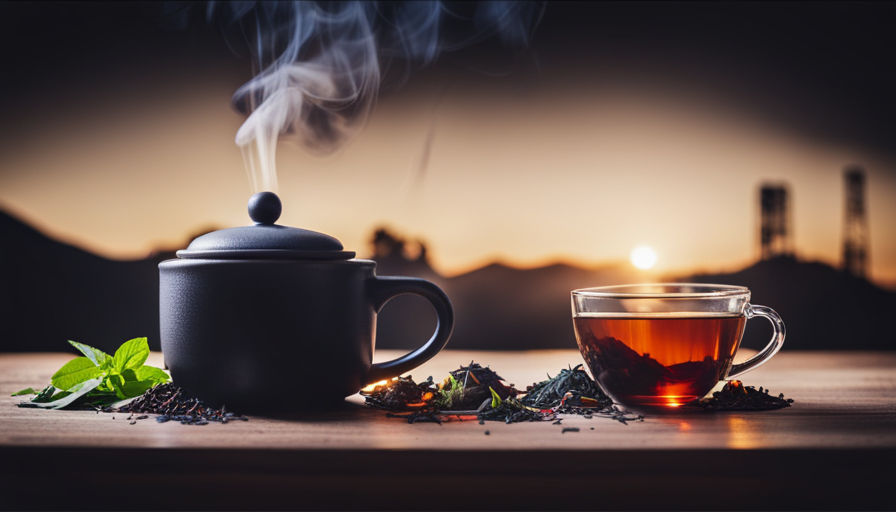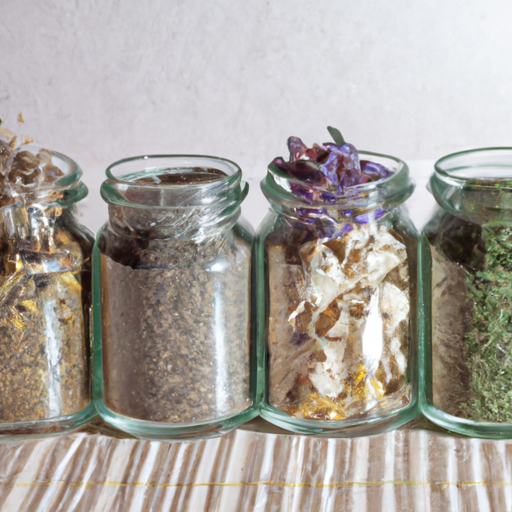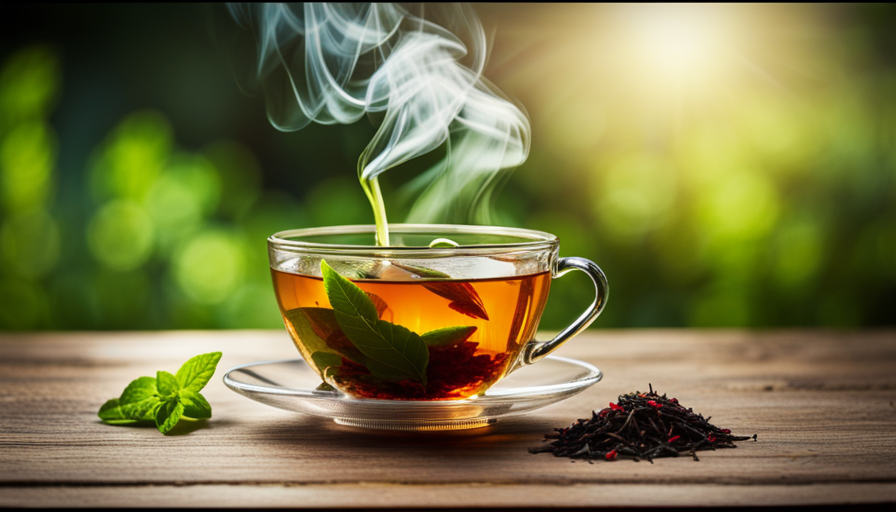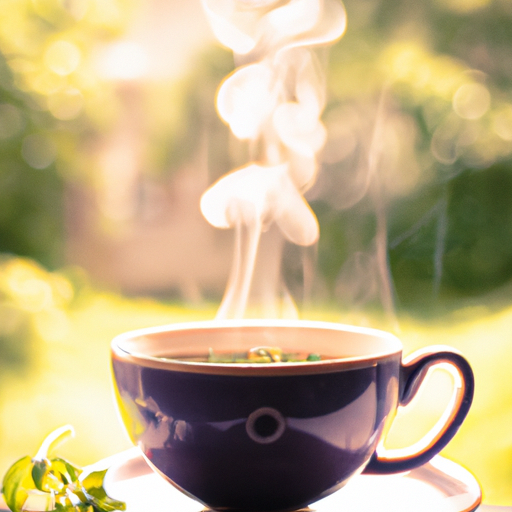You might be skeptical about the idea that something as simple as herbal tea can have a significant impact on your mental health. After all, how can a warm cup of tea really make a difference?
But let me assure you, the benefits of herbal tea for mental health are supported by evidence and have been recognized for centuries. From reducing anxiety and stress to improving sleep quality and enhancing cognitive function, herbal tea has a range of positive effects on our well-being.
In this article, we will explore how herbal tea affects mental health and delve into the science behind its calming properties. Whether you’re a tea enthusiast or new to the world of herbal infusions, understanding the role of herbal tea in promoting mental wellness is essential.
So, grab a cup of your favorite blend and join me as we uncover the fascinating ways in which herbal tea can nurture our minds and support our mental well-being.
Key Takeaways
- Herbal tea has positive effects on mental health, reducing anxiety and stress.
- Chamomile and lavender teas have calming properties and aid in relaxation before bed.
- Lemon balm and passionflower teas can reduce anxiety and improve sleep quality.
- Ginseng, ginkgo biloba, and rosemary teas enhance cognitive function, improving memory and focus.
Understanding the Benefits of Herbal Tea for Mental Health
If you’re looking for a natural way to boost your mental well-being, herbal tea might just be the answer you’ve been searching for. Not only does herbal tea offer a wide range of flavors and aromas, but it also has numerous benefits for mental health.
One of the key benefits is its ability to boost mood. Certain herbs, such as chamomile and lavender, have calming properties that can help alleviate feelings of sadness or irritability. By promoting relaxation, herbal tea can create a sense of calm and tranquility, allowing you to unwind after a long day.
Moreover, herbal tea has been shown to have a positive impact on reducing anxiety and stress. The act of sipping on a warm cup of tea can provide a moment of mindfulness, helping to center your thoughts and bring a sense of peace. Additionally, herbs like lemon balm and passionflower have been found to have anxiety-reducing properties, further enhancing the calming effects of herbal tea. By incorporating herbal tea into your daily routine, you can actively work towards reducing anxiety and stress in your life.
In the subsequent section, we will explore how herbal tea can further support mental well-being by improving sleep quality and boosting cognitive function.
Reducing Anxiety and Stress with Herbal Tea
Relieve your stress and anxiety by incorporating this simple and natural remedy into your daily routine. Herbal tea has long been recognized for its calming effects on the mind and body. It is a popular choice for those seeking relaxation and mindfulness.
To understand how herbal tea reduces anxiety and stress, let’s take a closer look at its key components and their benefits. Many herbal teas contain herbs like chamomile, lavender, and lemon balm, which have soothing properties and promote relaxation. These herbs contain compounds that can help reduce the production of stress hormones and induce a sense of calm. Additionally, the act of preparing and drinking herbal tea can be a mindful ritual, allowing you to focus on the present moment and let go of worries.
To illustrate the benefits of herbal tea for anxiety and stress reduction, consider the following table:
| Herbal Tea | Benefits |
|---|---|
| Chamomile | Calming effects, reduces anxiety |
| Lavender | Promotes relaxation, aids sleep |
| Lemon Balm | Reduces stress, improves mood |
Incorporating herbal tea into your daily routine can be a simple and effective way to manage stress and anxiety. By promoting relaxation and mindfulness, herbal tea can help you achieve a greater sense of well-being. Next, we will explore how herbal tea can also improve sleep quality.
Improving Sleep Quality with Herbal Tea
Incorporating herbal tea into your nightly routine can help you achieve a restful and rejuvenating sleep. When it comes to improving sleep quality, herbal tea offers numerous benefits.
Firstly, herbal teas such as chamomile and lavender have been widely recognized for their calming properties. These teas contain natural compounds that promote relaxation and reduce anxiety, making it easier for you to unwind before bed. Additionally, the ritual of preparing and sipping herbal tea can have a soothing effect on your mind, preparing it for a peaceful night’s sleep.
Furthermore, certain herbal teas, like valerian root and passionflower, have been found to enhance sleep quality by increasing the production of GABA, a neurotransmitter that promotes relaxation and reduces brain activity. This can lead to a deeper and more restorative sleep, leaving you feeling refreshed and energized in the morning.
By incorporating herbal tea into your nightly routine, you can experience the benefits of improved sleep. Not only will you wake up feeling more rested, but you may also notice enhanced cognitive function throughout the day. Herbal tea is a natural and effective way to support your mental well-being and overall health.
Enhancing Cognitive Function with Herbal Tea
Enhancing cognitive function can be achieved by regularly consuming herbal tea, which has been shown to have positive effects on mental clarity and focus. Studies have demonstrated that certain herbal teas contain compounds that can enhance memory retention, improve focus, and increase concentration.
To understand the impact of herbal tea on cognitive function, let’s explore the benefits of specific herbal teas in a table format:
| Herbal Tea | Memory Retention | Focus and Concentration |
|---|---|---|
| Ginseng | Yes | Yes |
| Ginkgo Biloba | Yes | Yes |
| Rosemary | Yes | Yes |
Ginseng, known for its stimulating properties, has been found to enhance memory and cognitive performance. Ginkgo Biloba, another popular herbal tea, contains antioxidants that improve memory and concentration. Rosemary tea, with its aromatic properties, has been found to enhance memory retention and increase focus.
Regular consumption of herbal tea can be a simple and enjoyable way to naturally boost cognitive function. By incorporating herbal teas into your daily routine, you may experience improved memory, enhanced focus, and increased concentration.
In the next section, we will explore the calming effects of herbal tea, providing further insight into the benefits of incorporating this natural remedy into your lifestyle.
Exploring the Calming Effects of Herbal Tea
When we sip on a warm cup of herbal tea, we can feel a sense of tranquility wash over us, allowing us to unwind and relax. But what is it about herbal tea that brings this calming effect?
One aspect to explore is the taste of herbal tea. Each herb used in these teas possesses unique flavors that can be both soothing and refreshing. From the floral notes of chamomile to the earthy taste of lavender, the diverse range of herbal teas caters to different preferences, enhancing the overall experience of relaxation.
In addition to the taste, it’s essential to examine the potential side effects of herbal tea. While generally considered safe, some herbs may interact with medications or have adverse effects on certain individuals. It’s important to research and consult with healthcare professionals to ensure the herbal tea is suitable for personal circumstances.
Transitioning to the next section about choosing the right herbal tea for mental well-being, it’s crucial to consider both taste preferences and potential side effects. By understanding the impact of herbal tea on mental health and exploring the various options available, we can make informed choices that promote overall well-being.
Choosing the Right Herbal Tea for Mental Well-being
After exploring the calming effects of herbal tea, it’s important to delve into the process of choosing the right herbal tea for mental well-being. Each type of herbal tea possesses unique therapeutic properties that can positively impact our mental health. By selecting the appropriate herbal tea, we can enhance our relaxation and promote a sense of calmness.
When it comes to choosing the right herbal tea for relaxation, it’s crucial to consider the specific mental health benefits we seek. For instance, chamomile tea is widely known for its calming properties and can help alleviate symptoms of anxiety and depression. On the other hand, lavender tea is renowned for its ability to reduce stress and promote better sleep. Additionally, green tea contains L-theanine, an amino acid that’s been found to improve focus and reduce anxiety.
Exploring the therapeutic properties of herbal tea is a crucial step in finding the right blend that suits our individual needs. By incorporating herbal tea into our daily routine, we can experience the mental health benefits it offers. Whether it’s sipping a cup of chamomile tea before bedtime or enjoying a refreshing cup of green tea in the morning, herbal tea can be a simple yet powerful tool in promoting our overall well-being.
Incorporating Herbal Tea into Your Daily Routine for Mental Health Benefits
Imagine starting your day with a steaming cup of liquid serenity, gently coaxing your mind into a state of tranquility. Incorporating herbal tea into your morning routine can have significant mental health benefits, providing a moment of calm and self-care amidst the chaos of daily life.
Herbal tea has long been known for its soothing properties and ability to promote relaxation. By incorporating this simple practice into your daily routine, you can create a powerful ritual that supports your mental well-being.
The role of herbal tea in self-care can’t be overstated. Taking the time to prepare and savor a cup of herbal tea can be a form of mindfulness, helping to ground you in the present moment and reduce stress. The act of brewing tea itself can be meditative, allowing you to focus on the sensations and aromas as they envelop your senses.
As you sip on your tea, the herbs work their magic, gently calming your mind and promoting a sense of tranquility.
In addition to its calming effects, herbal tea can also provide specific mental health benefits. Certain herbs, such as chamomile and lavender, have been shown to have anxiety-reducing properties. Others, like lemon balm and passionflower, can help alleviate symptoms of depression. By choosing the right herbal tea for your specific needs, you can enhance its mental health benefits and support your overall well-being.
Incorporating herbal tea into your daily routine is a simple yet powerful way to prioritize your mental health. So, why not start your day with a cup of liquid serenity? Embrace the calming effects of herbal tea and experience the transformative power it can have on your mental well-being.
Frequently Asked Questions
Can herbal tea completely cure mental health disorders?
Herbal tea research suggests that while it may have some benefits for mental health, it is not a cure for mental health disorders. It can be used as a part of alternative therapies to support overall well-being.
Can herbal tea replace medication for mental health treatment?
Herbal tea can be a complementary therapy for mental health treatment, but it cannot replace medication. Research shows that while herbal tea may help manage symptoms, it is not as effective as medication.
How long does it take for herbal tea to show its effects on mental health?
Herbal tea can show its effects on mental health within 30 minutes to an hour. It promotes relaxation and reduces stress through its calming properties, making it a valuable addition to relaxation techniques for mental health.
Are there any potential side effects of consuming herbal tea for mental health?
What potential interactions exist between herbal tea and medication? Is herbal tea a safe complementary therapy for mental health? It’s important to consider these factors to ensure the best outcomes for mental well-being.
Can herbal tea be harmful if consumed in excessive quantities for mental health benefits?
Excessive consumption of herbal tea for mental health benefits can pose potential risks. It is important to consider the recommended herbal tea dosage to avoid adverse effects on overall well-being.
Conclusion
In conclusion, herbal tea is a natural and effective way to support mental health. Its calming effects and ability to reduce anxiety and stress make it a valuable tool in managing our mental well-being.
Additionally, herbal tea can improve sleep quality and enhance cognitive function, allowing us to feel more focused and alert.
By incorporating herbal tea into our daily routine, we can experience these benefits and promote a healthier mind. So why not brew a cup of herbal tea today and take a step towards a more balanced and peaceful state of mind?










